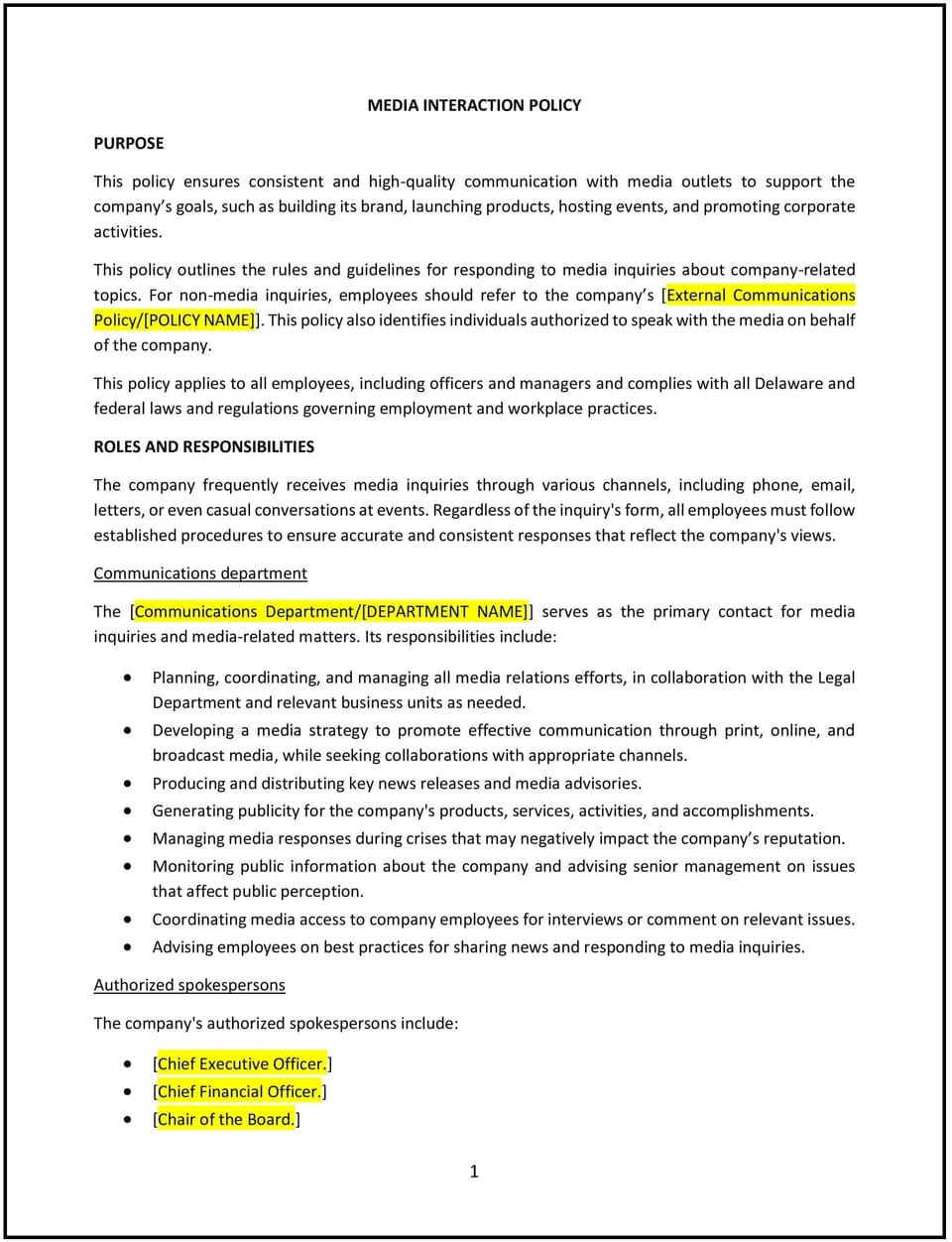Media relations policy (Delaware): Free template

Media relations policy (Delaware)
A media relations policy helps Delaware businesses manage interactions with media outlets to ensure consistent, accurate, and professional communication. This policy outlines procedures for responding to media inquiries, designating spokespersons, and handling sensitive information to protect the company’s reputation.
By implementing this policy, businesses can maintain control over public messaging, avoid misinformation, and promote a positive brand image.
How to use this media relations policy (Delaware)
- Designate spokespersons: Identify specific individuals authorized to communicate with the media on behalf of the company, such as executives or PR professionals.
- Establish approval processes: Require prior approval for any media communication, including interviews, press releases, or public statements.
- Outline response protocols: Provide clear steps for handling media inquiries, including referring them to the designated spokesperson.
- Protect sensitive information: Emphasize the importance of safeguarding proprietary or confidential information during media interactions.
- Provide training: Offer media training to authorized spokespersons to ensure they communicate effectively and align with the company’s messaging.
- Monitor media coverage: Regularly track media mentions of the company to assess the effectiveness of the policy and address inaccuracies promptly.
Benefits of using this media relations policy (Delaware)
This policy offers several benefits for Delaware businesses:
- Ensures consistent messaging: Promotes clear and accurate communication aligned with the company’s brand and values.
- Protects reputation: Reduces the risk of misinformation or unapproved statements damaging the company’s image.
- Safeguards confidentiality: Minimizes the risk of disclosing sensitive or proprietary information during media interactions.
- Enhances professionalism: Prepares designated spokespersons to handle media inquiries effectively and confidently.
- Reduces legal risks: Ensures compliance with Delaware laws regarding public statements and information disclosure.
Tips for using this media relations policy (Delaware)
- Communicate the policy clearly: Ensure all employees understand the procedures for handling media inquiries and the importance of referring them to authorized spokespersons.
- Maintain a media contact list: Keep an updated list of media contacts to streamline communication and ensure prompt responses.
- Prepare key messages: Develop and distribute approved messaging for common media inquiries to maintain consistency.
- Address crises proactively: Include guidelines for managing public relations crises to ensure a timely and appropriate response.
- Review regularly: Update the policy to reflect changes in Delaware laws, company practices, or media relations strategies.
Q: Why is a media relations policy important for my business?
A: This policy ensures consistent and professional communication with the media, protects the company’s reputation, and safeguards sensitive information.
Q: Who is authorized to speak to the media under this policy?
A: The policy designates specific individuals, such as executives or PR representatives, as authorized spokespersons to handle all media communications.
Q: What should employees do if they are contacted by the media?
A: Employees should refer all media inquiries to the designated spokesperson or PR team as outlined in the policy, without providing unauthorized information.
Q: How can my business prepare for potential media interactions?
A: Businesses can prepare by training spokespersons, maintaining pre-approved messaging for common inquiries, and developing a crisis communication plan.
Q: How often should this policy be reviewed?
A: This policy should be reviewed annually or whenever Delaware laws, media practices, or company communication strategies change to ensure continued relevance and effectiveness.
This article contains general legal information and does not contain legal advice. Cobrief is not a law firm or a substitute for an attorney or law firm. The law is complex and changes often. For legal advice, please ask a lawyer.


